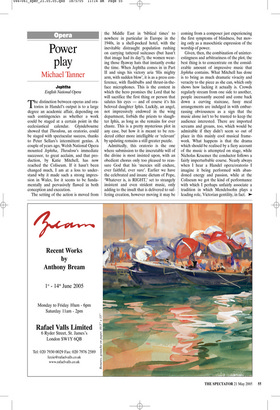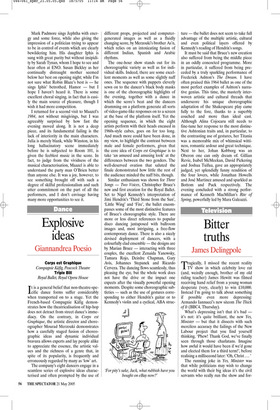Power play
Michael Tanner
Jephtha English National Opera
The distinction between operas and oratorios in Handel’s output is to a large degree an academic affair, depending on such contingencies as whether a work could be staged at a certain point in the ecclesiastical calendar. Glyndebourne showed that Theodora, an oratorio, could be staged with spectacular success, thanks to Peter Sellars’s intermittent genius. A couple of years ago, Welsh National Opera mounted Jephtha, Theodora’s immediate successor, to great acclaim, and that production, by Katie Mitchell, has now reached the Coliseum. If it hasn’t been changed much, I am at a loss to understand why it made such a strong impression in Wales, for it seems to be fundamentally and pervasively flawed in both conception and execution.
The setting of the action is moved from the Middle East in ‘biblical times’ to nowhere in particular in Europe in the 1940s, in a shell-pocked hotel, with the inevitable distraught population rushing on carrying tattered suitcases (but hasn’t that image had its day?), the women wearing those flyaway hats that instantly evoke the time. When Jephtha comes in in Part II and sings his victory aria ‘His mighty arm, with sudden blow’, it is as a press conference, with flashbulbs and thrust-in-theface microphones. This is the context in which the hero promises the Lord that he will sacrifice the first thing or person that salutes his eyes — and of course it’s his beloved daughter Iphis. Luckily, an angel, not impressively endowed in the wing department, forbids the priests to slaughter Iphis, as long as she remains for ever chaste. This is a pretty mysterious plot in any case, but how it is meant to be rendered either more intelligible or ‘relevant’ by updating remains a still greater puzzle.
Admittedly, this oratorio is the one where submission to the inscrutable will of the divine is most insisted upon, with an obedient chorus only too pleased to reassure God that his ‘mercies still endure, ever faithful, ever sure’. Earlier we have the celebrated and insane dictum of Pope, ‘Whatever is, is RIGHT,’ set to strangely insistent and even strident music, only adding to the insult that is delivered to suffering creation, however moving it may be coming from a composer just experiencing the first symptoms of blindness, but moving only as a masochistic expression of the worship of power.
Given, then, the combination of uninterestingness and arbitrariness of the plot, the best thing is to concentrate on the considerable amount of impressive music that Jephtha contains. What Mitchell has done is to bring as much dramatic vivacity and veracity to the piece as she can, which only shows how lacking it actually is. Crowds regularly stream from one side to another, people incessantly ascend and come back down a curving staircase, fussy meal arrangements are indulged in with embarrassing obviousness as a sign that the music alone isn’t to be trusted to keep the audience interested. There are imported screams and groans, too, which would be admirable if they didn’t seem so out of place in this mainly cool musical framework. What happens is that the drama which should be realised by a fiery account of the music is attempted on stage, while Nicholas Kraemer the conductor follows a fairly imperturbable course. Nearly always when I hear a Handel opera/oratorio I imagine it being performed with abandoned energy and passion, while at the Coliseum we got the kind of performance with which I perhaps unfairly associate a tradition in which Mendelssohn plays a leading role, Victorian gentility, in fact. Mark Padmore sings Jephtha with energy and some force, while also giving the impression of a politician trying to appear to be in control of events which are clearly bewildering him. His daughter Iphis is sung with great purity but without insipidity by Sarah Tynan, whom I hope to see and hear often at ENO. Susan Bickley as her continually distraught mother seemed below her best on opening night; while I’m not sure what Robin Blaze’s best is — he sings Iphis’ betrothed, Hamor — but I hope I haven’t heard it. There is some excellent choral singing, in fact that is easily the main source of pleasure, though I wish it had more competition.
I returned for a second visit to Maazel’s 1984, not without misgivings, but I was agreeably surprised by how fast the evening moved along. It is not a deep piece, and its fundamental failing is the lack of interiority in the main characters. Julia is merely blank, while Winston, in his long hallucinatory scene immediately before he is subjected to Room 101, is given the feeblest music in the score. In fact, to judge from the vividness of the musical characterisation, Maazel is able to understand the party man O’Brien better than anyone else. It was a joy, however, to see something brought off with such a degree of skilful professionalism and such utter commitment on the part of all the performers, and I don’t envisage having many more opportunities to see it.


























































 Previous page
Previous page